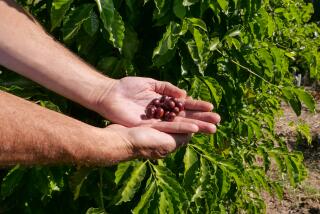Colombia coffee growers boost already-high prices by going green
Reporting from Manizales, Colombia â These are golden days for coffee grower Segundo Cardona and thousands of other farmers in Colombia. Global prices for his beans are close to 14-year highs and according to some analysts, may remain at or near these levels for years to come.
FOR THE RECORD:
Colombian coffee: An article in the Sept. 26 Section A about rising coffee prices misspelled the last name of Rabobank agriculture economist Guilherme Melo in Sao Paulo, Brazil, as Memo. â
The reasons include less than optimal harvests in top coffee-producing countries Brazil and Vietnam and growing consumption in major coffee-producing countries Brazil and Mexico as well as in traditional tea-drinking nations, including China, India and Russia.
Worldwide coffee consumption has grown an average of about 2% a year over the last decade, double the 1% annual average increase in supply.
âIt is a classic market imbalance,â said Rabobank agricultural economist Guilherme Memo in Sao Paulo, Brazil, citing International Coffee Organization statistics showing a 30% spike in prices over the last year for arabica, the coffee typically grown in Colombia. Prices of robusta, the variety identified with Brazil, have increased about 12%.
Another factor boosting prices is growing consumer insistence on so-called specialty coffees, a trend that growing numbers of Colombian farmers, including Cardona, are tapping into.
The worldâs largest coffee retailer, Starbucks, announced Thursday that it was raising prices, just as many supermarkets have done in recent months. CEO Howard Schultz cited the âextreme nature of cost increasesâ in justifying the move.
Instead of merely selling his beans in bulk, Cardona, 77, will soon be receiving a premium of up to 10% above the standard price once his coffee is labeled âfair trade certified,â as he expects later this year. The label is bestowed by Fair Trade Colombia, a nonprofit organization that helps market coffee for growers who farm eco-friendly beans.
Cardona over the last year has begun conserving more water, given workers protective masks to protect against harmful dust and stopped using certain hazardous chemicals.
A coffee grower for half a century, Cardona was slow to jump on the specialty coffee bandwagon, even though the local growers cooperative has been actively campaigning for farmers to join.
âGrowing it their way just seemed too complicated. But the prices justify it, and getting the seal will also bring other benefitsâ Cardona said. Those benefits include health and funeral expenses aid in a program financed by the National Federation of Coffee Growers of Colombia with a portion of the price windfall.
Federation Director Luis Genaro Munoz said in an interview here that more than one-third of all Colombian coffee now qualifies for one âvalue-addedâ specialty status or another, up from less than 5% in the early 1990s. The strategy has paid off because Colombiaâs specialty coffee sales are growing at three times the global growth rate.
One of the specialty coffee labels most sought after by Colombian growers is that of the New York-based Rainforest Alliance, which gives its mark of approval to growers who fulfill specific environmental requirements and promote high health and education standards for workers and their children.
Twenty percent of all coffee grown in the state of Huila, home to Colombiaâs second-largest coffee harvest, now earns the Rainforest Allianceâs imprimatur. The program is partially sponsored by the U.S. Agency for International Development, which sees growing premium coffee as a way to raise living standards.
The expanding specialty market for growers âis leaving the market tight on supplyâ for the arabica beans Colombia is famous for, said Judith Ganes-Chase, who heads a commodities research firm in Katonah, N.Y.
And tighter supplies means higher prices paid by consumers for beans grown in Colombia, which is the worldâs fourth largest coffee producer after Brazil, Vietnam and Indonesia and accounts for about 8% of all coffee grown.
Kraul is a special correspondent.
More to Read
Sign up for Essential California
The most important California stories and recommendations in your inbox every morning.
You may occasionally receive promotional content from the Los Angeles Times.










